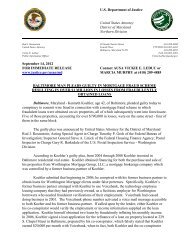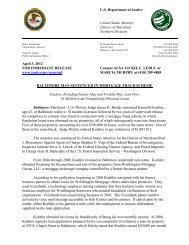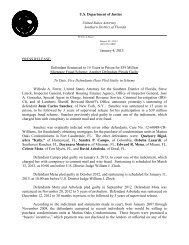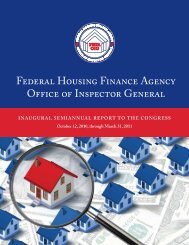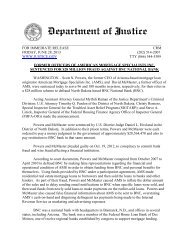FEDERAL
Sixth Semiannual Report to the Congress - Federal Housing ...
Sixth Semiannual Report to the Congress - Federal Housing ...
- No tags were found...
Create successful ePaper yourself
Turn your PDF publications into a flip-book with our unique Google optimized e-Paper software.
Interest Rate Swap: An interest rate swap is<br />
an agreement in which two parties make interest<br />
payments to each other for a set period based upon<br />
a notional principal (amount of principal of the<br />
underlying debt security). The notional principal is<br />
only used to calculate the interest payments; no risk is<br />
attached to it. Interest rate swaps commonly involve<br />
exchanging payments based on a fixed interest rate<br />
for payments based on a floating rate (e.g., London<br />
Interbank Offered Rate). The fixed rate is known as<br />
the swap rate.<br />
Internal Controls: Internal controls are an integral<br />
component of an organization’s management that<br />
provide reasonable assurance that the following<br />
objectives are achieved: (1) effectiveness and<br />
efficiency of operations, (2) reliability of financial<br />
reports, and (3) compliance with applicable<br />
laws and regulations. Internal controls relate to<br />
management’s plans, methods, and procedures<br />
used to meet its mission, goals, and objectives and<br />
include the processes and procedures for planning,<br />
organizing, directing, and controlling program<br />
operations as well as the systems for measuring,<br />
reporting, and monitoring program performance.<br />
Joint and Several Liability: The concept of joint<br />
and several liability provides that each obligor in<br />
a group is responsible for the debts of all in that<br />
group. In the case of the FHLBanks, if any individual<br />
FHLBank were unable to pay a creditor, the other<br />
11—or any 1 or more of them—would be required<br />
to step in and cover that debt.<br />
Loan-to-Value: A percentage calculated by dividing<br />
the amount borrowed by the price or appraised value<br />
of the home to be purchased; the higher the loan-tovalue<br />
(also known as LTV), the less cash a borrower is<br />
required to pay as down payment.<br />
Mortgage-Backed Securities: MBS are debt<br />
securities that represent interests in the cash flows—<br />
anticipated principal and interest payments—from<br />
pools of mortgage loans, most commonly on<br />
residential property.<br />
Noncontrolling Interest: A noncontrolling interest<br />
is the portion of equity (net assets) in a subsidiary<br />
not attributable directly or indirectly to a parent<br />
company. A noncontrolling interest is sometimes<br />
called minority interest and is reported in the<br />
consolidated statements of financial position. It is<br />
to be placed within the equity section but shown<br />
separately from the parent company’s equity.<br />
Operational Risk: Exposure to loss resulting from<br />
inadequate or failed internal processes, people, and<br />
systems or from external events (including legal<br />
events).<br />
Options: Contracts that give the buyer the right, but<br />
not the obligation, to buy or sell a specified quantity<br />
of a commodity or other instrument at a specific<br />
price within a specified period of time, regardless of<br />
the market price of that instrument.<br />
Preferred Stock: A security that usually pays a fixed<br />
dividend and gives the holder a claim on corporate<br />
earnings and assets superior to that of holders of<br />
common stock but inferior to that of investors in the<br />
corporation’s debt securities.<br />
Private-Label Mortgage-Backed Securities:<br />
MBS derived from mortgage loan pools assembled<br />
by entities other than GSEs or federal government<br />
agencies. They do not carry an explicit or implicit<br />
government guarantee, and the private-label MBS<br />
investor bears the risk of losses on its investment.<br />
Real Estate Owned: Foreclosed homes owned by<br />
government agencies or financial institutions, such as<br />
the enterprises or real estate investors. REO homes<br />
represent collateral seized to satisfy unpaid mortgage<br />
loans. The investor or its representative then must sell<br />
the property on its own.<br />
Securitization: A process whereby a financial<br />
institution assembles pools of income-producing<br />
Semiannual Report to the Congress • April 1, 2013–September 30, 2013 75



